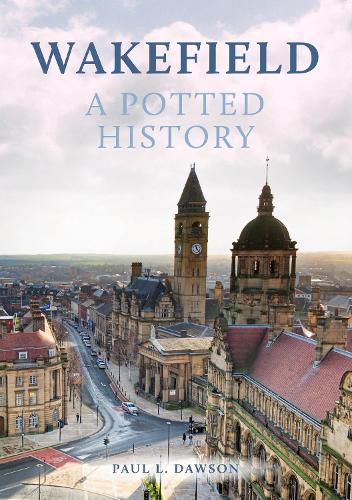Readings Newsletter
Become a Readings Member to make your shopping experience even easier.
Sign in or sign up for free!
You’re not far away from qualifying for FREE standard shipping within Australia
You’ve qualified for FREE standard shipping within Australia
The cart is loading…






Wakefield was originally a settlement on the River Calder in West Yorkshire, first Anglo-Saxon, then Viking controlled. After the Norman Conquest, the manor passed to the de Warenne family and Wakefield grew into an important market town in the area. In the Wars of the Roses Richard, Duke of York, was killed at the Battle of Wakefield. Wakefield’s prosperity was growing as an inland port and a centre for tanning, the wool trade and coal mining. By the Industrial Revolution, Wakefield was a wealthy town, benefiting from the opening of the Aire & Calder Canal, which enabled it to trade goods, particularly grain and cloth, throughout the country. Wool mills were built in the nineteenth century and Wakefield became the administrative centre in West Riding, given city status in 1888. Although many industries closed in the later decades of the twentieth century, including its extensive coalfields, the city has embarked on a programme of regeneration, which includes the new Hepworth Wakefield art gallery, named after Wakefield-born artist Barbara Hepworth.
Through successive centuries the author looks at what has shaped Wakefield’s history. Illustrated throughout, this accessible historical portrait of the transformation that Wakefield has undergone through the ages will be of great interest to residents, visitors and all those with links to the city.
$9.00 standard shipping within Australia
FREE standard shipping within Australia for orders over $100.00
Express & International shipping calculated at checkout
Wakefield was originally a settlement on the River Calder in West Yorkshire, first Anglo-Saxon, then Viking controlled. After the Norman Conquest, the manor passed to the de Warenne family and Wakefield grew into an important market town in the area. In the Wars of the Roses Richard, Duke of York, was killed at the Battle of Wakefield. Wakefield’s prosperity was growing as an inland port and a centre for tanning, the wool trade and coal mining. By the Industrial Revolution, Wakefield was a wealthy town, benefiting from the opening of the Aire & Calder Canal, which enabled it to trade goods, particularly grain and cloth, throughout the country. Wool mills were built in the nineteenth century and Wakefield became the administrative centre in West Riding, given city status in 1888. Although many industries closed in the later decades of the twentieth century, including its extensive coalfields, the city has embarked on a programme of regeneration, which includes the new Hepworth Wakefield art gallery, named after Wakefield-born artist Barbara Hepworth.
Through successive centuries the author looks at what has shaped Wakefield’s history. Illustrated throughout, this accessible historical portrait of the transformation that Wakefield has undergone through the ages will be of great interest to residents, visitors and all those with links to the city.